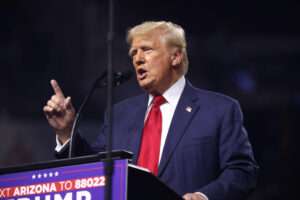The Volokh Conspiracy
Mostly law professors | Sometimes contrarian | Often libertarian | Always independent
Special Counsel Jack Smith Files Revised Trump Indictment in Election Subversion Case
The revised indicment is intended to address the Supreme Court's presidential immunity ruling in Trump v. United States.

Yesterday special counsel Jack Smith filed a revised, superseding indictment in the federal criminal case against Donald Trump for his attempts to overturn the results of the 2020 presidential election. The revised indictment attempts to address the Supreme Court's flawed decision in Trump v. United States, which ruled that presidents have broad immunity against criminal prosecution for "official acts," but was far from clear about exactly how far that immunity extends. On an e-mail list that we are both members of, Princeton legal scholar Kim Lane Scheppele posted a helpful summary of how the revised indictment differs from the original one, which she has kindly agreed to allow me to reprint here:
- Complying with the SCOTUS immunity decision, Smith seems to have scrubbed all "official conduct" evidence from the case and presented it again before a new grand jury, which brought forth this indictment. That move makes it more difficult for the Trump legal team to claim that the case should be dismissed because the evidence presented to the grand jury was tainted. They've clean-teamed this all the way down.
- The indictment charges the same four crimes as before.
- But the indictment leaves out Jeffrey Clark as an unindicted coconspirator given what SCOTUS said about absolute immunity of the president in his conversations with the Justice Department.
- The indictment emphasizes that the other unindicted coconspirators are all PRIVATE citizens working on the campaign or as consultants. And it makes clear that the various other actors implicated and whose testimony will be called upon at trial are NOT talking with Trump in the scope of his duties as president.
- Crucial elements of the case are now attributed to CANDIDATE Donald Trump and Candidate Mike Pence so that it is clear that they are not interacting as president and vice president in the relevant conversations.
The Just Security analysis by Norm Eisen, Matt Seligman and Joshua Kolb had flagged which parts of the indictment they thought would stand and which would not – and that analysis was pretty spot-on – see https://www.justsecurity.org/98457/immunity-january-6th-chutkan/ and https://www.justsecurity.org/wp-content/uploads/2024/08/united-states-v.-trump-dC-%E2%80%93-annotated-j6-eisen-seligman-kolb.pdf
For a line by line comparison of the new indictment and the original, see Allison Gill's post here. Lawfare and Jacob Sullum of Reason have also posted helpful analyses of the superseding indictment.
Will the superseding indictment survive inevitable immunity-based challenges? I think Smith makes a good case that the crimes Trump is charged with are private acts, not official ones, and that - even if official acts cannot be used as evidence (as the Supreme Court wrongly ruled), there is enough evidence against Trump to convict on all or most of the charges. Justice Amy Coney Barrett's concurring opinion in the Supreme Court decision provides additional analysis on why Trump's conduct here was private, not official (though it is notable that none of the other majority justices joined her). I also continue to believe that Trump is likely guilty on these charges and, if convicted, deserves severe punishment for reasons of both retribution and deterrence.
But the Supreme Court ruling is far from a model of clarity on several key points relevant to the case. Among other things, the line between private acts and official ones is a nebulous one. And when it comes to official acts outside the president's "core powers," it's not clear whether there is a mere presumption of immunity (which can potentially be overcome), or whether the immunity is absolute. The line between core powers and other official acts is also often unclear. Thus, it's hard to predict what will happen here, when the issues are reviewed by the trial judge, the DC Circuit and - potentially - the Supreme Court.
The one thing that is clear is that the issues are unlikely to be fully resolved before the election on November 5. If Trump wins, he will almost certainly find a way to get the charges dismissed after he takes office. If he loses, the case against him (or at least part of it) will proceed, unless courts rule that all the charges are barred by immunity. The latter scenario strikes me as unlikely, but not completely impossible.
Again, the Supreme Court's decision is vague on key points, and different judges are likely to interpret it differently. If the case returns to the Supreme Court, we may even find that the majority justices disagree among themselves on some of these questions. The ambiguities in the ruling may be a way to paper over these differences, at least for the time being. We may learn more about what the justices think on these issues, as this legal battle continues.


Show Comments (104)